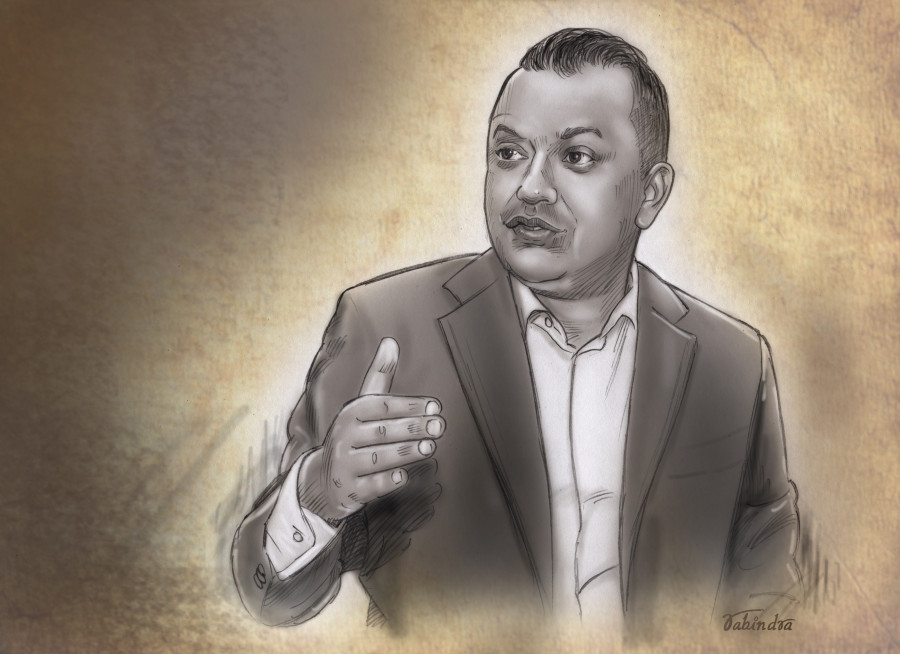Columns
A case for Gagan Thapa
There are compelling reasons for why he should lead the Nepali Congress into the next general elections.
Biswas Baral
How Gagan Thapa wishes there were more than 24 hours in a day! He would then be able to meet most of his social obligations. As preparations get underway for the next Nepali Congress general convention, due at the end of 2025, the party general secretary is routinely inundated with meeting requests. Cadres start lining up outside his Ratopul home early in the morning as Thapa, holed up in the kitchen inside, is busy packing tiffin boxes for his two girls.
Now 48, the ex-health minister believes the 15th general convention will be a make or break event for him. He has seen some erosion in his fame following the entry of new forces in Nepali politics. The best way to stem this slide would be to win the party presidency and go into the next general elections as the party’s prime ministerial face.
Given the fast pace of change in national politics, he might not get another shot at leading the party—or the country as prime minister. This is why he is keen on mending ties with current President Sher Bahadur Deuba. As things stand, the incumbent president could have the final say in the pick of his successor.
“I believe there is an undeclared understanding between the two: Deuba will next lead the government, and Gagan will look after party affairs,” says a trusted adviser of Thapa.
In this telling, Deuba realises the futility of pushing his wife, Arzu Rana Deuba, up the party hierarchy. She is not a popular figure among the Congress rank and file. So the best bet for Arzu’s continued relevance in the party is to get Thapa to agree to ‘adjusting’ her in some role after Deuba steps down. In case Thapa declines to do so, the desperate husband might conceivably offer a similar bargain to other aspirants for party presidency.
Some say the five-time prime minister, the political animal that he is, will not quietly bow out of politics even after he relinquishes the party chair. That he will continue to pull the strings from behind the curtain.
That is unlikely. Deuba’s influence in the party, now at its apogee, will at once decline when he is no longer in a position to dole out plum ministries and party posts.
Coming back to Thapa, for all his strengths, it would be a mistake to assume the party presidency will fall into his lap. If, for example, Shekhar Koirala is in the fray, Thapa will be going toe to toe with a formidable foe.
“In my reckoning, Koirala can beat Thapa if the two face off in the general convention,” says Tula Narayan Shah, a keen political observer while cupping a glass of steaming peach black tea.
The general convention representatives vote in blocks. Shah, a Nepali Congress footsoldier in his student days, thinks the Koirala name still carries a lot of weight for many such Congressi blocks. “Or how could Shashank get the most votes in the election for central committee members in the last general convention? What other qualification did he have?”
Also working in Koirala’s favour will be his long preparation for the top job— “while never holding a government portfolio,” Shah adds. Moreover, many in the Congress believe that while Thapa has age on his side, and will get another shot in the future, Koirala, at 74, may not have that luxury.
But even the first-level elections to choose Congress general convention delegates have not started. It would thus be premature to talk of new factions which will only start solidifying around a handful of leaders at the end of 2025.
The likes of Purna Bahadur Khadka and Bimlendra Nidhi, another two aspirations for the top job who too are long-time Deuba acolytes, would have some say in how things shape up. So would Shashank Koirala and Prakash Man Singh.
Yet a compelling case can be made for why the Congress would do well to go into the next general elections under Gagan Thapa. With the country looking for a clean break from the past, this next generation leader with sound intellect and unmatched oratory will be a good electoral fit. He also has a clean image. Again, no other top Congress leader is anywhere close to the MP from Kathmandu-4 on any of these fronts.
Yes, Thapa’s popularity has gone down. But if he gets to lead the party again, he is more than capable of regaining much of the lost lustre.
A leader who is always in the spotlight is bound to get into some controversies. As has Thapa. Someone who came to prominence during the 2006 April Revolution, he can sometimes sound more like a rabble-rouser than a cool-headed thinker. Really, when you have natural swag, why sweat it?
His relations with the party chief have also come under scrutiny. Even though Deuba has made one after another mistake, Thapa has blunted his criticism of the party president. Thapa quietly accepted the seven-point midnight Congress-UML deal even though he, the party’s general secretary, was kept in complete darkness.
A consummate politician, Thapa is clearly biding his time. But this also shows he thinks long term—always a good sign in a political leader.
It would be hard to argue that the Congress and the larger Nepali polity will be better served with the party electing Shekhar Koirala or any other leader of the older generation than it will be by picking Thapa.
If Thapa comes to power in the Congress, the CPN-UML and the Maoist Centre, the other two big parties, will also be forced to rethink their ossified leaderships: The UML is now under the thumb of KP Sharma Oli, just like Pushpa Kamal Dahal continues to maintain an absolute grip over the Maoist Centre.
At this juncture, of the three major forces, the Congress appears by far the most democratic outfit. A seamless transfer of power to the torchbearer of the next generation will reinforce this image.




 18.12°C Kathmandu
18.12°C Kathmandu















